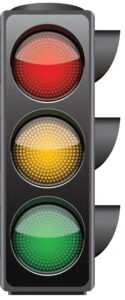Traffic lights – whether you love them or hate them – help to control the flow of traffic. They tell you when it is your turn to GO, STOP, or use CAUTION. We all understand how they work, and they have been around since 1868! But what you may not be as familiar with is the Functional Pathways Traffic Lights!
What are they?
Functional Pathways has a plethora of traffic light handouts to facilitate and guide residents of typical signs of their health conditions, such as Heart Disease, COPD, Stroke, and even COVID. The star of today’s show is the traffic lights for therapy services! Staying well is everyone’s priority, so utilizing these helpful tools can assist residents, families and caregivers to thrive in place and avoid hospitalizations.
Green Means Go!
All is well – therapy services most likely are not needed.
Yellow – Time to Act!
Therapy might be helpful to ensure you are able to participate in your favorite activities with ease and prevent risk of a decline in function.
Red – STOP!
New onset of these symptoms could result in a hospital admission if the issue is not addressed. Contact your therapy team immediately.
Interested in learning more about all our resources that encourage health and wellness? – reach out to the therapy team at Functional Pathways! Wishing you a very Happy and Healthy New Year!
OUTPATIENT THERAPY TRAFFIC LIGHT

DANGER SIGNS – STOP!
Physical Therapy: Falling/unsteady or shuffling gait, Pain, Shortness of breath that does not resolve quickly, Unable to do stairs, Trouble with getting in/out of bed, chair, or car safely.
Occupational Therapy: No longer bathing, cooking and/or cleaning, Incontinence, Not participating in social events, Not leaving your house or apartment.
Speech Language Pathology: Not eating/drinking due to choking or coughing, Forgetting important dates/people, Sudden onset of slurred speech/unable to communicate, Unable to pay bills/keep meds straight.
CAUTION SIGNS – TIME TO ACT!
Physical Therapy: Out of breath/less energy, Fear of alling/occasional loss of balance, Concerns about getting in/out of a bed, chair or car safely.
Occupational Therapy: Occasional incontinence concerns, Trouble with grooming/basic hygiene, bathing and/or dressing, Trouble with light housekeeping/cooking, Less comfortable going to social events.
Speech Language Pathology: Some difficulty completing tasks you could previously do, Difficulty finding words or carrying on a conversation, Coughing when/after taking medications, eating or drinking.
GOOD SIGNS – ALL IS WELL!
Physical Therapy: Balance is goo, Able to walk without concern/maintain usual activity level, Pain-free range of motion, Able to get in/out of a bed, chair or car safely, No shortness of breath.
Occupational Therapy: No concerns with hand strength, No visual problems, No concerns with adaptive equipment, No concerns with grooming/basic hygiene, cooking, bathing, dressing, housekeeping.
Speech Language Pathology: Can remember to take medications/pay bills, No memory concerns, No difficulty finding words/carry on conversations, Able to keep appointments, No concerns with eating/swallowing.





 © 2025 Kirby Pines LifeCare Community. All Rights Reserved |
© 2025 Kirby Pines LifeCare Community. All Rights Reserved | 